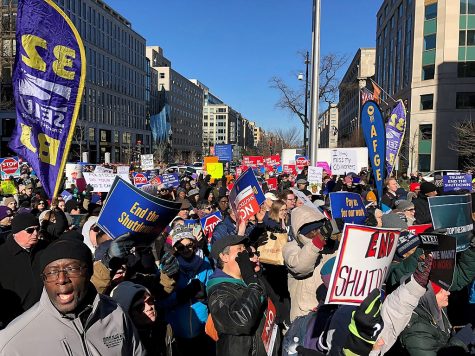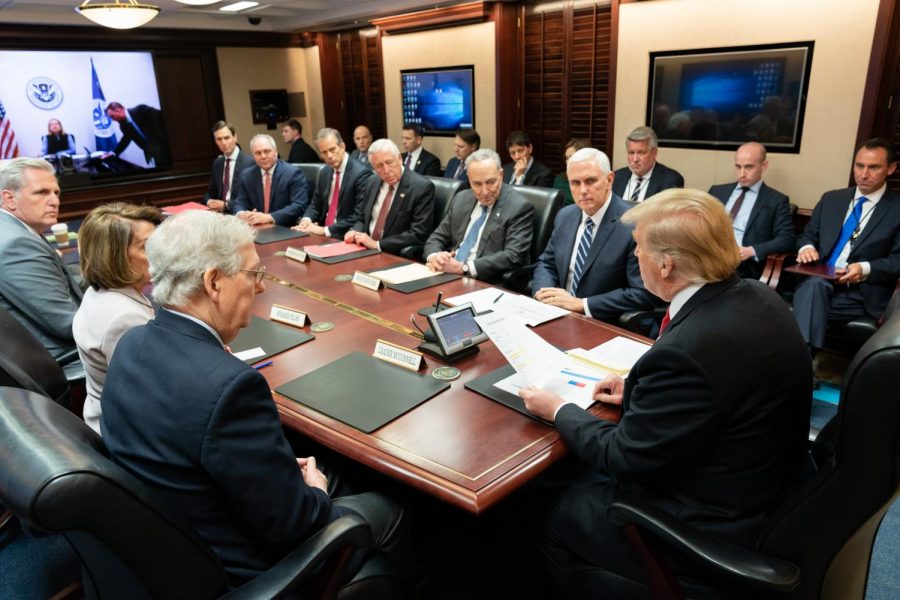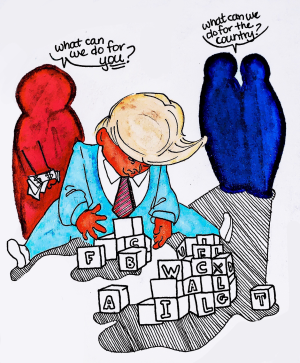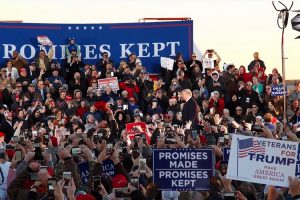Colley: Shutdown Shutters
By The White House from Washington, DC – President Trump Meets With Congressional Leadership, Public Domain, Link
January 14, 2019
The recent U.S. government shutdown officially broke records and became the longest in U.S. history. The partial shutdown has been ongoing since Dec. 22, 2018, as a result of the Democrat-led House of Representatives refusing to fund President Donald Trump’s promised wall on the southern border with Mexico. Trump has led the effort for funding the wall, with threats ranging from keeping the shutdown going for years to declaring a national emergency to build the wall without congressional approval.
Assuming you are familiar with what this partial shutdown actually entails, I would like to bring attention to the impending crisis facing the U.S. if the Republicans and Trump make good on their threat to keep the shutdown going indefinitely. The immediate issue is the lack of pay for several hundreds of thousands of federal workers. For instance, the Transportation Security Administration workers are being forced to continue working without pay due to their being essential for national security. The effects of this will be severe as a large portion of people will be left unable to support their families, pay for their homes, or cope with any other expense. This has coincided with an increase in workers calling in sick, and there is talk among a minority about going on strike, a justified action. One cannot be expected to work for a boss who isn’t paying them; that’s essentially slavery just because the government deems them essential.

Hundreds of people rally in protest of the shutdown.
The most critical issues have yet to come. For instance, as we move into February, welfare programs will start to run out of funding. My personal prediction is that the general quality of life will fall, and riots seem inevitable. A few months into the shutdown would leave state governments starting to struggle.
With these factors in mind, I personally see this as less a war between Trump and Congress and more a war of attrition between the U.S. government and the American people. Those in power must realize that people won’t just completely fall victim to squabbles between the rich members of the government and the vast portion of working people who already struggle to get by. Even if one supports the wall, they have to realize that the potential fallout of a prolonged shutdown is simply not worth this. The lives of the American people simply shouldn’t be a playing card. This is likely why the shutdown at the latest won’t continue past the beginning of February.
Then, there’s the second of the threats. Trump has made repeated pleas to the American people that his wall is necessary in addressing the national security crisis at the border. His language almost invokes a sense that we are being invaded by immigrants and asylum-seekers. This is where we get into the territory of him simply declaring a state of emergency at the border, diverting Department of Defense funds, and building the wall unilaterally, bypassing Congress entirely. Albeit, they intended this power to be invoked in a wartime scenario. While this would quickly solve the shutdown issue, there are much deeper and philosophical issues at hand afterward. Simply put, this would likely create a constitutional crisis the likes of which have never been seen in the United States. A power struggle would likely ensue between the White House, Congress, and the Supreme Court as we attempt to answer the question if the president is truly allowed to do this. A state of emergency isn’t something simple. While Trump likely wouldn’t do such a thing, there is nothing stopping him from declaring a state of emergency in the entirety of the United States under the same pretense, effectively ceasing almost total power over the country. This line would be something dire to cross.
Overall, the two options Trump presents will certainly have dire consequences. The most probable outcome, however, will be his giving up on wall funding entirely or some type of compromise being made with Congress. Despite what happens, we must remember one thing. The masses are the ones with the real power, and we must resist any attacks upon us, whether they be political or material, by any means necessary. We must act.












